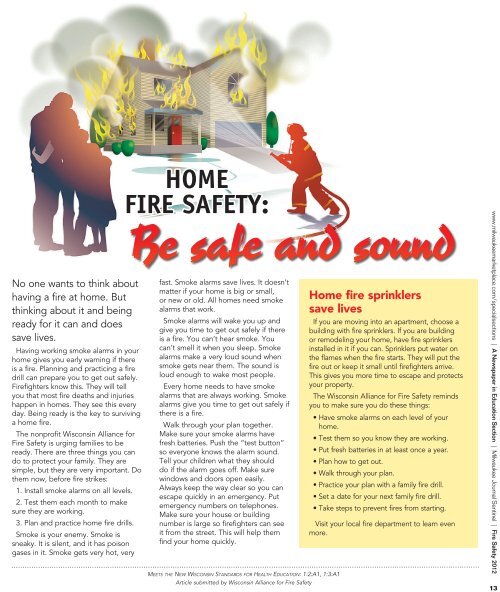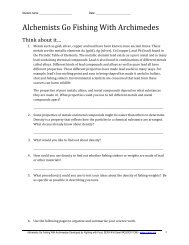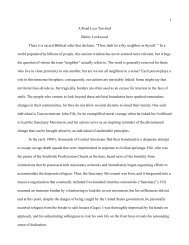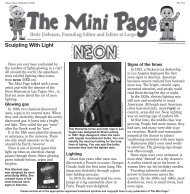Download the Fire Safety Section PDF - Newspapers In Education
Download the Fire Safety Section PDF - Newspapers In Education
Download the Fire Safety Section PDF - Newspapers In Education
Create successful ePaper yourself
Turn your PDF publications into a flip-book with our unique Google optimized e-Paper software.
No one wants to think about<br />
having a fire at home. But<br />
thinking about it and being<br />
ready for it can and does<br />
save lives.<br />
Having working smoke alarms in your<br />
home gives you early warning if <strong>the</strong>re<br />
is a fire. Planning and practicing a fire<br />
drill can prepare you to get out safely.<br />
<strong>Fire</strong>fighters know this. They will tell<br />
you that most fire deaths and injuries<br />
happen in homes. They see this every<br />
day. Being ready is <strong>the</strong> key to surviving<br />
a home fire.<br />
The nonprofit Wisconsin Alliance for<br />
<strong>Fire</strong> <strong>Safety</strong> is urging families to be<br />
ready. There are three things you can<br />
do to protect your family. They are<br />
simple, but <strong>the</strong>y are very important. Do<br />
<strong>the</strong>m now, before fire strikes:<br />
1. <strong>In</strong>stall smoke alarms on all levels.<br />
2. Test <strong>the</strong>m each month to make<br />
sure <strong>the</strong>y are working.<br />
3. Plan and practice home fire drills.<br />
Smoke is your enemy. Smoke is<br />
sneaky. It is silent, and it has poison<br />
gases in it. Smoke gets very hot, very<br />
Home<br />
fire safety:<br />
Be safe and sound<br />
fast. Smoke alarms save lives. It doesn’t<br />
matter if your home is big or small,<br />
or new or old. All homes need smoke<br />
alarms that work.<br />
Smoke alarms will wake you up and<br />
give you time to get out safely if <strong>the</strong>re<br />
is a fire. You can’t hear smoke. You<br />
can’t smell it when you sleep. Smoke<br />
alarms make a very loud sound when<br />
smoke gets near <strong>the</strong>m. The sound is<br />
loud enough to wake most people.<br />
Every home needs to have smoke<br />
alarms that are always working. Smoke<br />
alarms give you time to get out safely if<br />
<strong>the</strong>re is a fire.<br />
Walk through your plan toge<strong>the</strong>r.<br />
Make sure your smoke alarms have<br />
fresh batteries. Push <strong>the</strong> “test button”<br />
so everyone knows <strong>the</strong> alarm sound.<br />
Tell your children what <strong>the</strong>y should<br />
do if <strong>the</strong> alarm goes off. Make sure<br />
windows and doors open easily.<br />
Always keep <strong>the</strong> way clear so you can<br />
escape quickly in an emergency. Put<br />
emergency numbers on telephones.<br />
Make sure your house or building<br />
number is large so firefighters can see<br />
it from <strong>the</strong> street. This will help <strong>the</strong>m<br />
find your home quickly.<br />
Meets <strong>the</strong> New wiscoNsiN staNdards for health educatioN: 1:2:a1, 1:3:a1<br />
Article submitted by Wisconsin Alliance for <strong>Fire</strong> <strong>Safety</strong><br />
Home fire sprinklers<br />
save lives<br />
If you are moving into an apartment, choose a<br />
building with fire sprinklers. If you are building<br />
or remodeling your home, have fire sprinklers<br />
installed in it if you can. Sprinklers put water on<br />
<strong>the</strong> flames when <strong>the</strong> fire starts. They will put <strong>the</strong><br />
fire out or keep it small until firefighters arrive.<br />
This gives you more time to escape and protects<br />
your property.<br />
The Wisconsin Alliance for <strong>Fire</strong> <strong>Safety</strong> reminds<br />
you to make sure you do <strong>the</strong>se things:<br />
• Have smoke alarms on each level of your<br />
home.<br />
• Test <strong>the</strong>m so you know <strong>the</strong>y are working.<br />
• Put fresh batteries in at least once a year.<br />
• Plan how to get out.<br />
• Walk through your plan.<br />
• Practice your plan with a family fire drill.<br />
• Set a date for your next family fire drill.<br />
• Take steps to prevent fires from starting.<br />
Visit your local fire department to learn even<br />
more.<br />
www.milwaukeemarketplace.com/specialsections | A Newspaper in <strong>Education</strong> <strong>Section</strong> | Milwaukee Journal Sentinel | <strong>Fire</strong> <strong>Safety</strong> 2012<br />
13

















